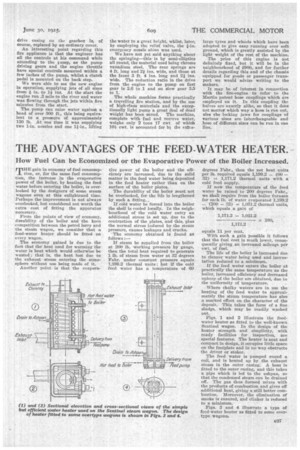THE ADVANTAGES OF THE FEED-WATER HEATER.
Page 11

If you've noticed an error in this article please click here to report it so we can fix it.
How Fuel Can be Economized or the Evaporative Power of the Boiler Increased.
TEIE gain in economy of fuel consumption, or, for the same fuel consumption, the increase in the evaporative power of the boiler, by heating the feed water before entering the boiler, is overlooked by the designers of some steam wagons even at this enlightened time. Perhaps the improvement is not always overlooked, but considered not worth the extra cost of fitting the apparatus necessary.
From the points of view of economy, durability of the boiler and the keen competition between the petrol lorry and the steam wagon, we consider that a feed-water heater should be fitted on every wagon.
The economy gained is due to the fact that the heat used for warming the water is heat which would otherwise be wasted ; that is, the heat lost due to the exhaust steam entering the atmosphere without use being made of it.
Another point is that the evapora
tive power of the boiler and the efficiency are increased, due to the solid matter in the feed water being deposited in the feed heater rather than on the surface of the boiler plates.
The durability of the boiler must not be overlooked, for the life is lengthened by such a fitting. _ If cold water be forced into the boiler the shell is cooled locally. In the neighbourhood of the cold water entry an additional stress is set up, due to the contraction of the plates, and this, plus the normal stress induced by the steam Pressure, causes leakages and cracks.
The economy obtained is found as follows :— If steam be supplied from the boiler at 200 lb. working pressure by gauge, then the total heat required to generate 1 lb. of steam from water at 32 degrees Fehr. under constant pressure equals 1,199.2 thermal units ; but if the cold feed water has a temperature of 60 degrees Fehr., then the net heat units per lb. required equals 1,199.2 — (60 — 32) 1,171.2 thermal units with a cold feed supply.
If now the temperature of the feed water be raised to 200 degrees Fehr., we shall require from the boiler furnace for each lb. of water evaporated 1,1992 — (200 — 32) = 1,081.2 thermal units, which equals a gain of 1,171.2 — 1,031.2 x 100, 1,171.2
equals 11 per cent.
With such a gain possible it follows that the fuel cost is much lower, consequently giving an increased mileage per mt. of fuel.
The life of the boiler is increased due to cleaner water being used and incrustation reduced to a minimum.
If the feed water enters the boiler at practically the same temperature as the boiler, increased efficiency and decreased upkeep of the boiler are obtained, due to the uniformity of temperature.
Where chalky waters are in use the heating of the feed water to approximately the steam temperature has also a marked effect on the character of the deposit. This takes the form of a fine sludge, which may be readily washed out.
Pigs. I. and 2 illustrate the feedwater heater as fitted to the well-known Sentinel wagon. In the design of the heater strength and simplicity, with ready facilities for inspection, are special features. The heater is neat and compact in design, it occupies little space on the footplate and in no way obstructs the driver or stoker.
The feed water is pumped round a coil, and is heated up by the exhaust steam in the outer casing. A boss is fitted to the outer casing, and this takes a pipe which is led to the ashpan, so that the condensed steam can be drained off. The gas thus formed mixes with the products of combustion and gives off additional heat, giving a still better combustion. Moreover, the elimination of smoke is ensured, and clinker is reduced to a minimum.
Figs. 3 and 4 illustrate a type of feed-water heater as fitted to some overtype wagons.






























